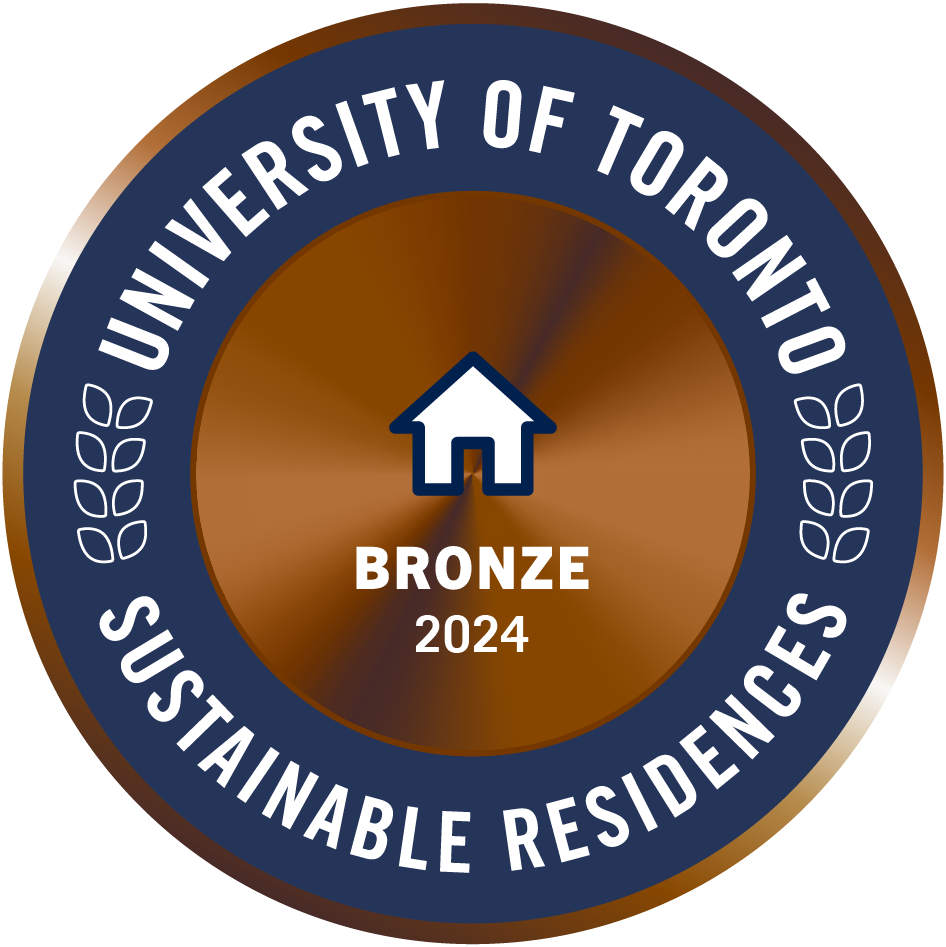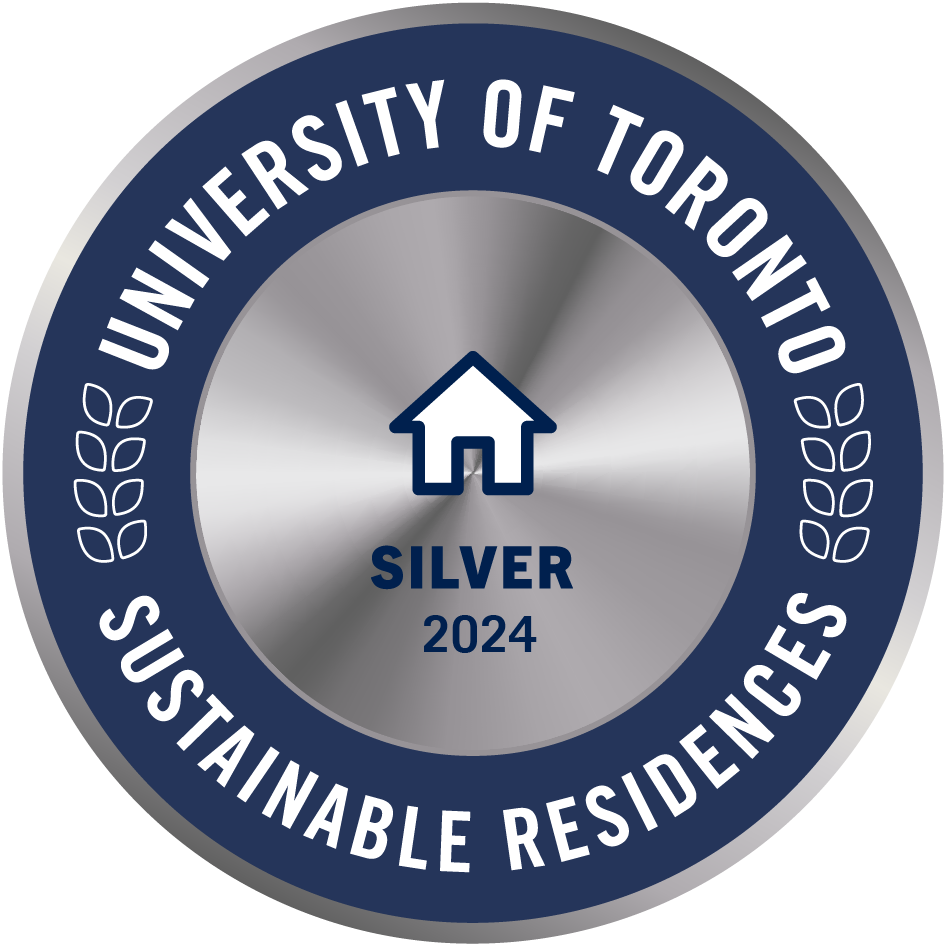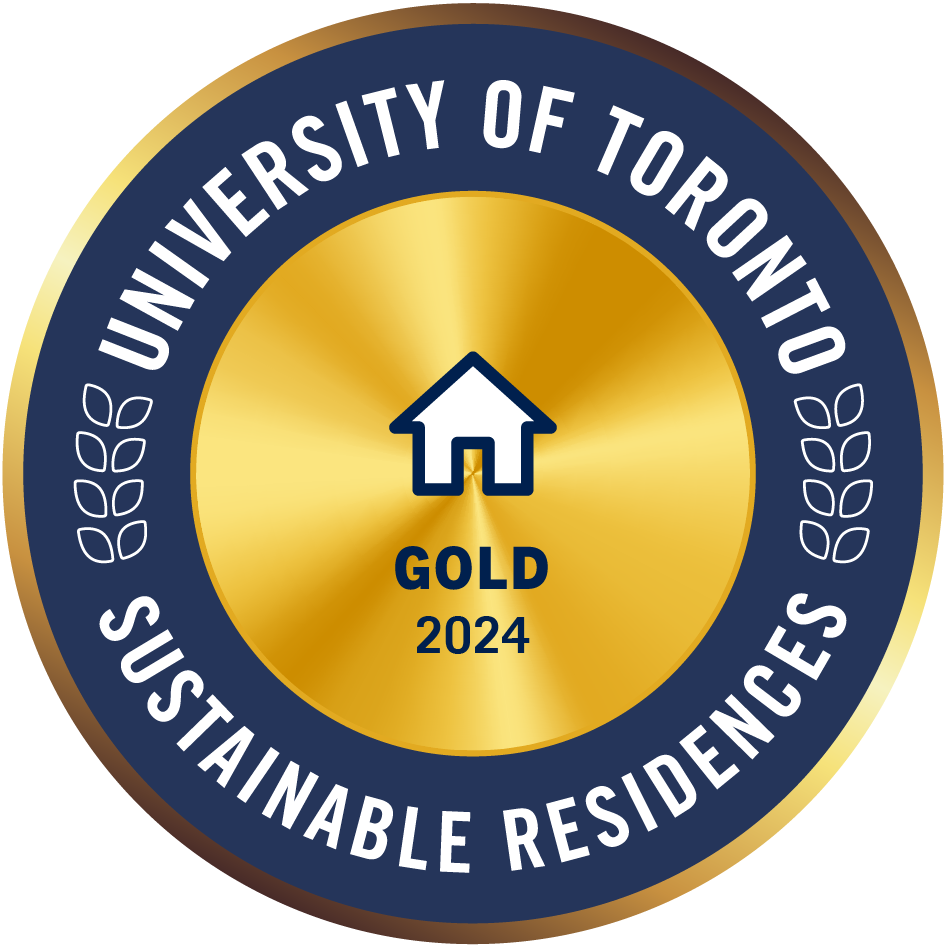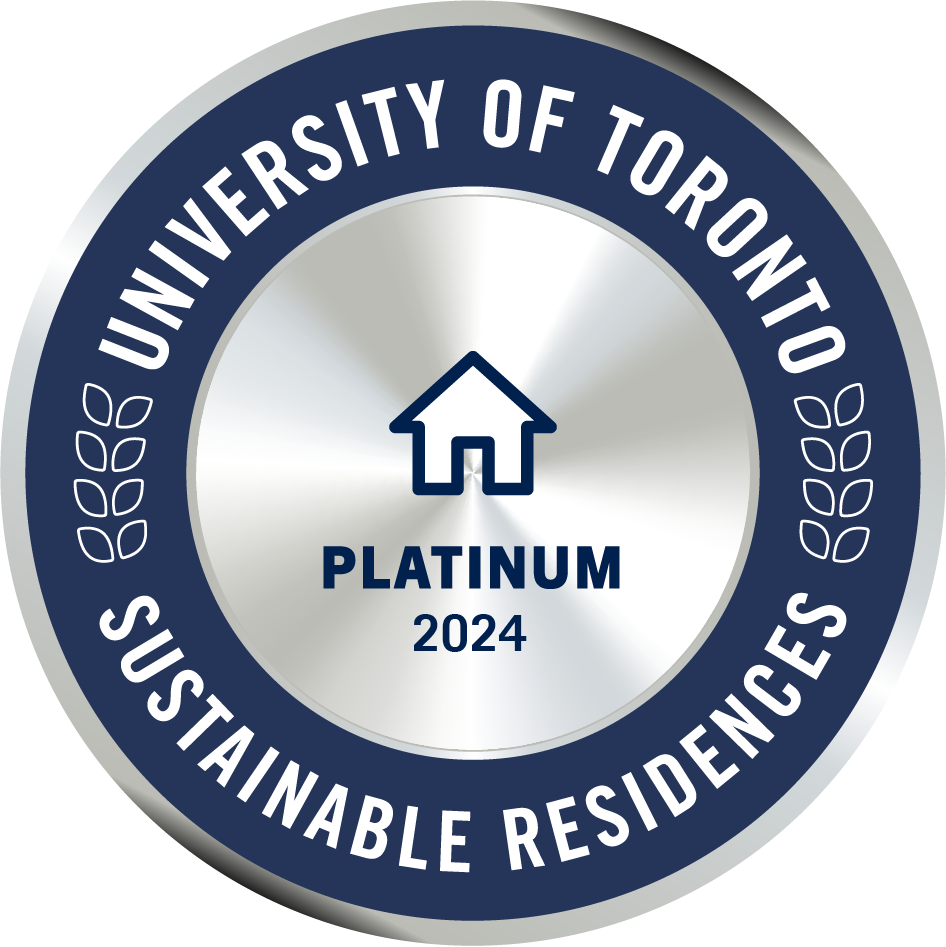Sustainability Office
Your hub for sustainability on the St. George campus.
Home / Sustainability / Sustainable change programs / Sustainable residences
Sustainable residences
Sustainable residences program
The Sustainability Office along with Facilities and Services consulted with students, faculty, and staff to create a comprehensive guide with program highlights, best practices, and resources for sustainable residences.
The certification form is divided into five sections:
- Energy Conservation
- Water Conservation
- Waste Reduction
- Transportation
- Lifestyle
Ready to get certified?
Have you reviewed the steps above and are ready to get certified? Click the button below to start.
Get inspired from others!
Who can certify?
U of T students residing on campus may participate in the Sustainable Residence Program. The certification typically begins with an individual and can be scaled up. Examples:
- Individual (your own space ie. your half of the dorm)
- Room
- Floor
- Residence
Certification

Bronze
20–45% of available points scored

Silver
46–65% of available points scored

Gold
66–84% of available points scored

Platinum
85% + of available points scored.
The Sustainability Office welcomes any comments or suggestions on program content.
Getting started
Before starting the certification form, review the Program Highlights for recommended actions.
Need more information on how to make your residence more sustainable? Check out the Resources page for information on best practices and tips.
Power strips are used for electrical devices.
Small electronics and appliances are shared with roommates/floormates.
Space lighting is used instead of overhead lighting.
Natural light is used whenever possible.
Light fixtures have LED lightbulbs.
Laundry is washed in cold water and on the gentle spin setting.
Laundry is air dried.
Cleaning and laundry products purchased are non-toxic and biodegradable.
Tap is shut off while brushing teeth and washing hands.
Shower time is reduced.
Waste is sorted into recycling, compost and trash.
Single-use plastics are avoided.
Reusable dinnerware and drinkware are used for on and off campus dining.
Hazardous and electronic waste is collected for proper disposal.
Household items that are no longer needed are repurposed, upcycled or donated.
Damaged items are repaired before they are replaced.
Public transit, biking or walking are the most utilized methods of transportation.
Carpool schedules are organized with roommate(s)/floormate(s) or neighbours.
Weekly meat and dairy consumption are reduced.
Meals are planned to avoid excessive leftovers and packaging waste.
Second-hand buy and sell apps are utilized.
Information and tips for sustainable living are shared with roommates/floormates.
Active living is incorporated into everyday routines.
The Sustainability Office welcomes any comments or suggestions on program content.
Sustainable living best practices
On-campus
Invest in a water filter and reusable water bottle.
Use power strips to plug in all electronics.
Shut off and unplug electronics at the end of the day.
Run washing machine with a full load and during off-peak hours.
Purchase non-toxic, biodegradable cleaners and laundry detergent.
Use wool balls instead of dryer sheets.
Purchase a clothing line or rack to hang wet laundry.
Opt for food options with minimal or no packaging.
Ask for no cutlery/sauce packets when ordering take-out.
Pack a reusable straw and cutlery set in your bag before leaving home.
Try borrowing or renting before buying.
Considering biking, walking, or using public transportation before using a personal vehicle.
Speak with roommates and floormates about sustainable lifestyle tips.
Off-campus
Open windows on cool evenings instead of running air conditioning.
Bundle up on clothing before raising the thermostat.
Close the windows when the furnace or air conditioning are running.
Ensure windows and doors are sealed to reduce drafts and heat escape.
Conduct bi-annual/annual fridge/freezer clear outs.
Purchase Energy Star certified appliances.
Unplug all small appliances and electronics when not in use.
Close the blinds/curtains in rooms that are not in use.
Air-dry laundry outside on a clothesline/rack.
Organize a carpool schedule with other commuters to campus.
Plant a pollinator garden with native plant species.
General resources
Off-campus resources
- Thermostat replacement: https://www.hydroone.com/saving-money-and-energy/residential/smart-thermostat
- Appliance Guide: https://www.hydroone.com/saving-money-and-energy/residential/tips-and-tools/appliances
- Energy Star Resources: https://www.energystar.gov/products/appliances
- TRCA Home and Garden Resources: https://trca.ca/get-involved/home-garden/
- How to Help Native Pollinators: https://www.toronto.ca/services-payments/water-environment/live-green-toronto/tips-to-create-a-pollinator-friendly-garden/
Lifestyle
- Farmers Market Ontario: https://www.farmersmarketsontario.com/
- Sustainability Events in Toronto: https://www.eventbrite.ca/d/canada–toronto/sustainability-events/
Low waste
- Repair Café: https://repaircafetoronto.ca/
Energy conservation
- Complete Guide for Energy Conservation: https://paylesspower.com/blog/vampire-energy/
- Carbon Footprint Calculator: https://www.nature.org/en-us/get-involved/how-to-help/carbon-footprint-calculator/
Waste disposal
- Hazardous Waste Disposal – Toronto: https://www.toronto.ca/services-payments/recycling-organics-garbage/household-hazardous-waste/
- Hazardous Waste Disposal – Region of Peel: Community Recycling Centres – Region of Peel (peelregion.ca)
- Waste Wizard – Toronto Region: https://www.toronto.ca/services-payments/recycling-organics-garbage/waste-wizard/
- How to sort waste – Peel Region: https://www.peelregion.ca/scripts/waste/how-to-sort-your-waste.pl
- How to Compost: https://ueat.utoronto.ca/the-student-kitchen/kitchen-basics-techniques/how-to-compost/
On-campus sustainability
- Get involved with U of T Hart House Farm: https://www.ulife.utoronto.ca/organizations/view/id/1666
- Sustainability Week: https://www.utm.utoronto.ca/mscsm/mscsm-news-events/special-events/sustainability-week
- Sustainability Campus Map and Resources: https://www.fs.utoronto.ca/SustainabilityOffice/Resources/StudentGroups
- List of compost bins available for on-campus dining:
Bahen Centre
Koffler Multi-Faith Centre
O.I.S.E
Sidney Smith
Gerstein Library
Koffler Student Centre
Robarts
Sylvester’s Cafe at Graduate Student Union
Innis College
Medical Sciences
Rotman
Woodsworth College
United Nations Sustainable Development Goals (SDGs)
The Sustainable Development Goals (SDGs) are a collection of 17 global goals designed to be a “blueprint to achieve a better and more sustainable future for all”. The SDGs were set up in 2015 by the United Nations General Assembly and are intended to be achieved by the year 2030.
The Sustainability Office welcomes any comments or suggestions on program content.
Get certified!
Ready to get your residence certified? Follow these easy steps!
- Review the program overview, highlights and resources tabs
- Click the ‘Get Certified’ button below
- Sign in using your UTORid to launch certification form and follow the instructions
- Submit the form and await review and confirmation from the Sustainability Office
- Receive your certificate package (certificate, badge/ribbon and quick resource guide)
- Review your results and program resources to improve your score next year!
Please complete the form in one session (form cannot be saved part-way). We recommend you use a laptop or desktop to complete the form.
Note: Certification is valid for one year, and the program will be updated/improved annually to ensure alignment with sustainability best practices.
The Sustainability Office welcomes any comments or suggestions on program content.
Our sustainability partners
